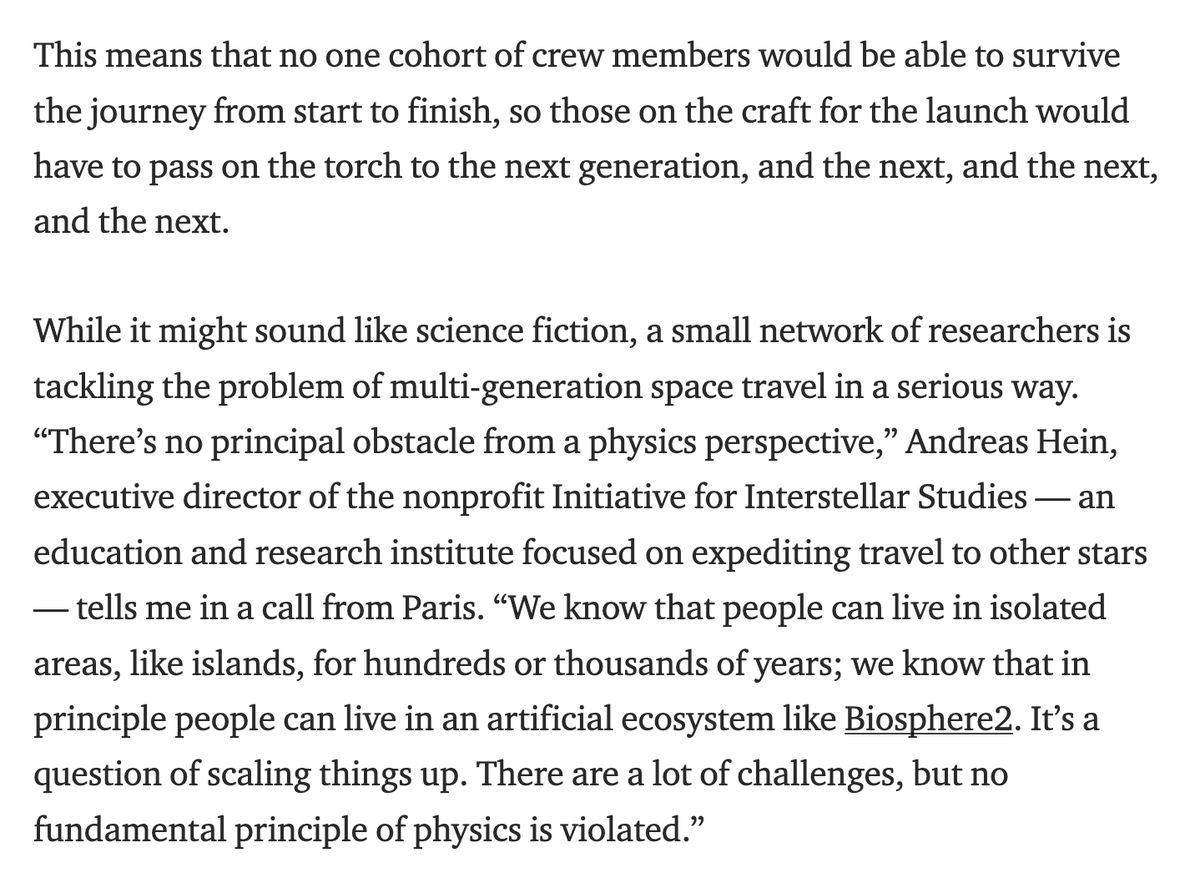-
Every time I hear about "multi-generational" futures off of Earth, I scan the article for evidence that the writer has actually considered pregnancy and birth as part of making future generations possible. Usually no. This time, no again. #Reproduction #TheFuture #Space @ozm/1204068982082428928
-
Reproduction, we learn, is possible "from a physics perspective." But what's important is biology: For example, "the important question of whether mammalian reproduction is indeed possible in space."
-
As Sayaka Wakayama et al observe, "Mammalian reproduction is very sensitive to environmental factors" and there have been no tests of mammalian reproduction in space. journals.plos.org/plosone/article?id=10.1371/journal.pone.0006753
-
(Egg-based animals—sea urchins, fish, amphibians and birds—have developed in simulated microgravity or on rockets.) newscientist.com/article/mg14519690-700-space-frogs-grow-up-to-lead-a-normal-life/ theguardian.com/science/blog/2013/sep/17/frogs-in-space-one-giant-leap
-
Early on-Earth tests on mice suggest that gravity is essential for mammalian embryo development. wired.com/2009/08/spacebabies/
-
Just five percent of rotated-gravity mouse embryos resulted in live births, versus 21% of controls. Simulated space mice mothers miscarried, a lot. journals.plos.org/plosone/article?id=10.1371/journal.pone.0006753
-
There are ongoing studies on how sperm react to space environments, but under controlled laboratory conditions, not in the bodies of astronauts who are exposed to radiation. nasa.gov/mission_pages/station/research/experiments/explorer/Investigation.html?#id=1922
-
But the really daunting questions are whether human sperm are catastrophically damaged by radiation, which is much greater in the interplanetary, and still greater in the interstellar environment. nasa.gov/feature/goddard/real-martians-how-to-protect-astronauts-from-space-radiation-on-mars (clip from next link)
-
… and whether conception and pregnancy are either possible or ethical in a space environment. smithsonianmag.com/smart-news/houston-we-might-have-some-major-problems-making-babies-space-180954828/
-
Can we ethically ask an experimental volunteer mother-to-be to subject herself to mutagenic radiation, uncertain developmental impacts, much higher rates of miscarriage, all to find out whether humans can give birth in space?
-
Moreover, how do we weigh the ethical risks to the offspring of such an experiment, risks that may be lifelong? And for which there is no possibilty of consent, informed or not.
-
Moreover, prior to a hypothetical multigenerational mission, what possible justification would there be to experimenting with zero-gravity birth and early childhood.
-
Shouldn't we expect the early years of human development, from shaping bones to learning to crawl to be profoundly gravity-dependent? How, and at what age, does a zero-gravity baby adapt to life on a planet?
-
Even presuming a (costly and heavy) simulated gravity environment in spacecraft, how might we gauge a minimum age at which to subject a test child to landing on a planetary surface, a grueling ordeal for trained adult volunteers?
-
And how many test children would have to be born in space before we could have some baseline for saying that space birth is safe enough for multigenerational space travel?
-
Successful zero-gravity and/or high-radiation fertilization, preganancy, childbirth, and childraising are all pre-requisites to multigenerational space travel. They are go-or-no-go conditions. Yet they rarely appear in visions of these futures.
-
Obviously, this oversight has everything to do with gender and the invisibility of reproductive labor in human life.
-
Now if these stories of interstellar space travel are just escape fantasies, then this is just cultural criticism. But if they are budget proposals than their advocates have to explain their way past the ethical bottleneck between us and our space grandchildren.
-
[The idea of the ethical bottleneck borrowed from Mary Midgley's critical writings on genetically engineering superhumans.]

